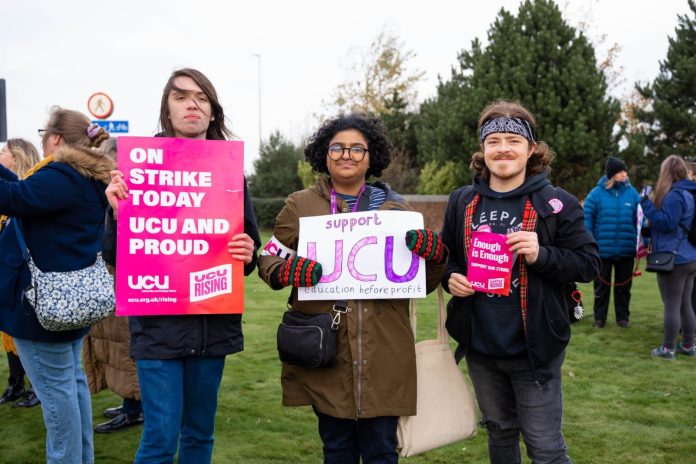Bea Gardner, UCU member
The 2023 congress of the University and College Union (UCU) meets 27-29 May, the first in-person congress since 2019. It takes place following unprecedented national strike action and during the first-ever national marking and assessment boycott (MAB) in higher education, and as the union prepares to ballot members in further education.
Workers across higher and further education face the cost-of-living squeeze alongside ongoing issues of high workloads and casualisation. The two sector conferences taking place during the congress will be important opportunities to evaluate the action already taken and prepare for the next steps.
In universities, members have made it clear they are willing to keep fighting. We have won two national mandates for strike action and – despite the best efforts of the general secretary to win acceptance – members rejected the latest employer proposals in the pay dispute. Alongside the immediate tasks of maintaining the MAB, we must also ensure our strike mandate is renewed so we can take strike action from day one of autumn term if needed.
Coordination with other unions should also feature in the strategy. UCU should take the lead in calling for the lay higher education sector leaderships of all the campus unions to urgently meet to discuss a strategy of coordination.
In further education, members are discussing the best way to maximise a ballot turnout. Socialist Party members agree with an aggregated ballot on workload and for national pay bargaining. But given that currently pay is negotiated college-by-college ,there is a legitimate discussion to be had amongst members to assess whether disaggregated ballots on pay would be better at this stage.
A consequence of rampant privatisation, alongside chronic underfunding by the government, is a huge variation in the financial position of colleges. So any campaign on pay has to be linked to a political campaign for increased funding for further education and an end to privatisation.
Democracy
On the wider congress agenda are critical debates over democracy in the union. Two motions criticise the role of the general secretary during the undemocratic ‘pausing’ of strike action: one calls for censure and the other for ‘no confidence’. The two motions are listed on the congress agenda with a warning from the union apparatus that “the union has received legal advice that the debate of these motions is not appropriate”.
This mirrors the situation in 2018, when similar motions levelled at then-general secretary Sally Hunt evoked protest from UCU staff members organised in the union Unite, which led to the suspension of congress. As we said then, it is entirely appropriate that branches and delegates want to use our democratic congress to hold the leadership of our union to account.
Jo Grady was elected following those events, on a platform that supported making the general secretary more accountable to members, including supporting proposals recommended by the union’s Democracy Commission. Yet her record has included numerous attempts to override the elected lay leadership of the union, including the union’s elected negotiators.
Another critical discussion will be how members make decisions about disputes. There are calls from a small number of branches for increased use of e-consultations and surveys. Such tools can play a part in helping appraise the mood of members and their appetite for action. But the danger is they can be used by a leadership that is looking to stifle debate.
We have seen this take place within UCU this year, with centralised surveys asking questions that conflate issues or do not include an option that members would have wanted to see. Results have been used to criticise decisions taken by the lay leadership, or strong-arm them to follow a course of action predetermined by the general secretary.
National dispute committees comprising elected representatives of every branch involved in a dispute would be a step forward, with such bodies having control over the agenda and decision making.
The strike wave is far from over and more unions are set to join the fight, with local government union Unison now balloting. Now is not the time to scale back our fight. But UCU members need to have confidence that the union’s leadership will back the fight of the members.
Join the discussion: ‘How we fight the anti-union laws’ at the National Shop Stewards Network conference in London on 24 June.
2023 NSSN Conference – Saturday 24 June in Conway Hall, London 11am-4.30pm –Attendance fee £6. You can register on the day at conference or email us in advance via [email protected]
Confirmed speakers so far: NIPSA General Secretary Carmel Gates, BFAWU General Secretary Sarah Woolley, POA General Secretary Steve Gillan, NAPO National Official Annoesjka Valent, GMB Officer Gary Palmer from the victorious #GMBThree







